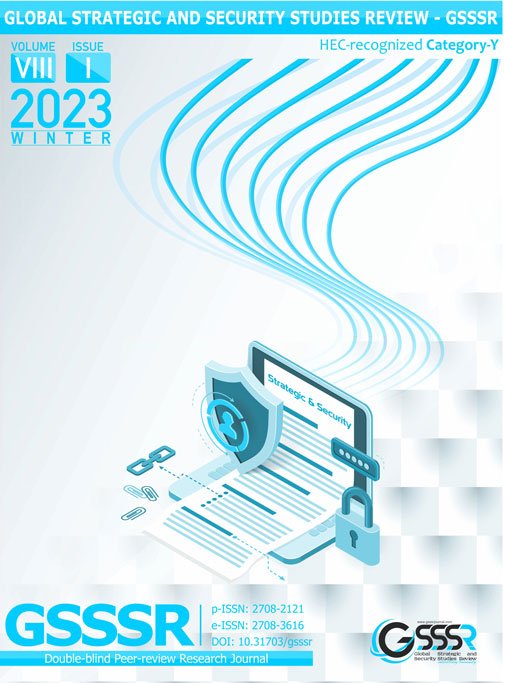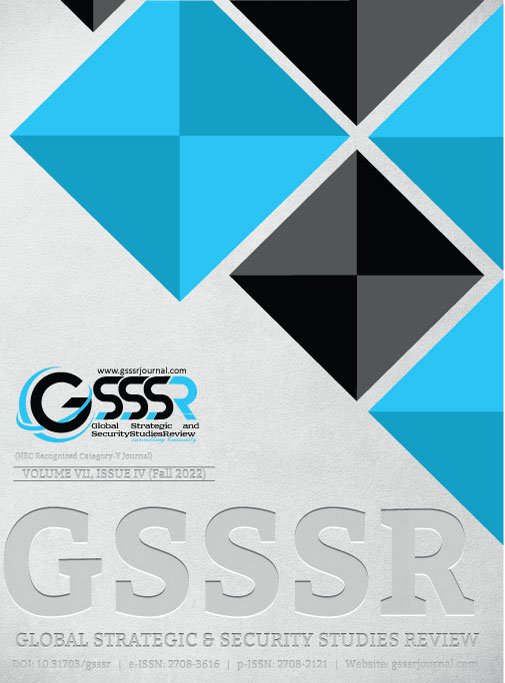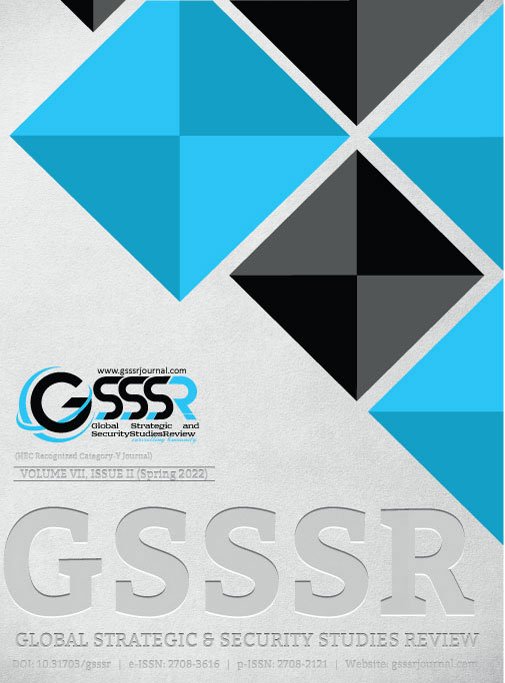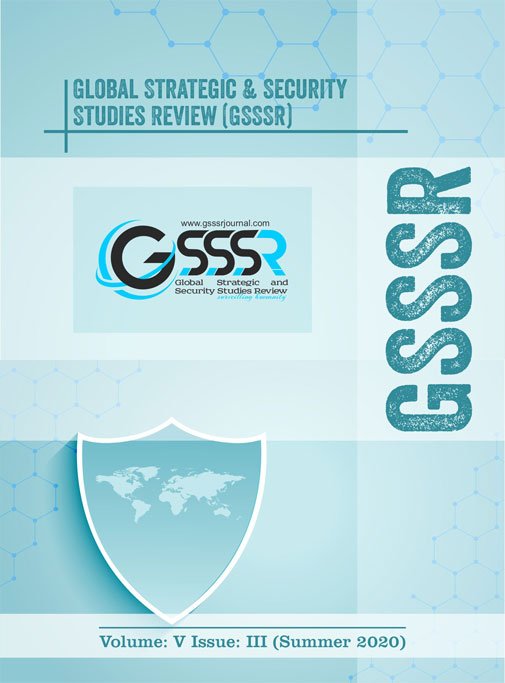01 - China's Geostrategic Interests in the Indian Ocean Region: Implications for Regi...
http://dx.doi.org/10.31703/gsssr.2024(IX-II).0110.31703/gsssr.2024(IX-II).01 Published : Jun 2024
-
Over the last decade, China has increased its footprint and economic power in the Indian Ocean by expanding its influence there. Critical concerns in the Indian Ocean pose a danger to regional security, according to this research. Realist theoryassesses China's economic and military achievements. There is a real possibility that unchecked Chinese development into the Indian Ocean would turn the en... Details
-
China, Indian Ocean, Regional security, Maritime, Silk Road
-
(1) Sahera Khatoon
PhD Scholar, Centre for South Asian Studies, University of the Punjab, Lahore, Punjab, Pakistan.
(2) Hamna Khan
Lecturer , Department of Pakistan Studies, Lahore College for Women University, Lahore, Punjab, Pakistan.
(3) Nadira Shafi
Lecturer, Department of Pakistan Studies, Lahore College for Women University, Lahore, Punjab, Pakistan.
02 - China's Expanding Influence in the Asia-Pacific: Strategic Implications for the ...
http://dx.doi.org/10.31703/gsssr.2024(IX-II).0210.31703/gsssr.2024(IX-II).02 Published : Jun 2024
-
The United States is increasingly active in the Asia-Pacific region to safeguard its global interests. As China’s economic power grows, it is posing challenges to U.S. hegemony. In response, the U.S. has formed alliances like AUKUS and the QUAD, emphasizing its Asia-Pacific policy to counter China. In contrast, China is expanding its economic influence by investing in infrastructure pr... Details
-
Asia-Pacific, United States, Strategic Implications, Diplomatic Relations
-
(1) Muhammad Soban Arif
Undergraduate, Department of International Relations, Government College University, Faisalabad, Punjab, Pakistan.
(2) Qasim Shahzad Gill
PhD, Johnson Shoyama Graduate School of Public Policy, University of Saskatchewan, Saskatoon, Saskatchewan, Canada.
(3) Ghulam Mustafa
Associate Professor, Department of International Relations, Government College University, Faisalabad, Punjab, Pakistan.
03 - The US-China Trade War in the 21st Century: A Critical Analysis ...
http://dx.doi.org/10.31703/gsssr.2024(IX-II).0310.31703/gsssr.2024(IX-II).03 Published : Jun 2024
-
China is a growing economy in the 21st Century with 18,536 (USD billion) GDP in 2024 while the USA is in rank 1st with 28,783(USD billion) GDP. Both Powers are trying to indulge other countries in economic deals. BRI, CPEC, and many other projects started by China to open the world market and expand trade. It's a check for the Economic Hegemonic design of the USA. Both Countries are trying to leve... Details
-
USA, China, Economic War, GDP, Hegemony, Growing Economies
-
(1) Hareem Asif
Undergraduate, Department of International Relations, Government College University Faisalabad, Faisalabad, Punjab, Pakistan.
(2) Muhammad Huzaifa Shahzad
Undergraduate, Department of International Relations, Government College University Faisalabad, Faisalabad, Punjab, Pakistan.
(3) Bilal Bin Liaqat
Assistant Professor, Department of International Relations, Government College University Faisalabad, Faisalabad, Punjab, Pakistan
04 - A Controversial Hypercritical Examination of Cybersecurity Policies in Pakistan ...
http://dx.doi.org/10.31703/gsssr.2024(IX-II).0410.31703/gsssr.2024(IX-II).04 Published : Jun 2024
-
Pakistan has witnessed a very fast digit transformation. The present article explains how this new technology has affected economic activities, critical infrastructure management, and communication dynamics in Pakistan. Without a doubt, digital infrastructure provides a way for the communication and interaction, which are also increasingly being targeted by hackers, cybercriminals, state proxy and... Details
-
Digital Information, Cyberattacks, Cybersecurity, Vulnerabilities, Legal Frameworks, Economic Activities, Critical Infrastructure, Communication Dynamics National Security
-
(1) Rana Zaheer ud din Ahmad
Advocate, High Court, Pakistan.
(2) Mirza Shahid Rizwan Baig
Assistant Professor, Department of Law, Government College University Faisalabad, Faisalabad, Punjab, Pakistan.
05 - Rise of Hindutva and the Security Architecture of South Asia ...
http://dx.doi.org/10.31703/gsssr.2024(IX-II).0510.31703/gsssr.2024(IX-II).05 Published : Jun 2024
-
The rise of Hindutva ideology is likely to alter secular India into a parochial Hindu nation by inducing a wave of militant nationalism across the state, which can potentially imperil the peace of South Asia. The aim of the study is to evaluate India's hegemonic stance, analyzing medieval and contemporary factors behind the surge of Hindu nationalism. It seeks to comprehend the core principles of ... Details
-
India, Hindutva, BJP, Nationalism, Pakistan, Extremism, Terrorism, Communal Violence, Regional Implications
-
(1) Ahmad Ali
Research Analyst, R&D (Research & Development) Branch, National Counter Terrorism Authority (NACTA) Islamabad, Pakistan.
(2) Fajar Nadeem
Analyst, National Counter Terrorism Authority (NACTA), Islamabad, Pakistan.
(3) Mehwish Tufail
Department of Political Science, Faculty of Social Sciences, Lahore College for Women University, Lahore, Punjab, Pakistan.
06 - Countering Climate Change and Emergency Preparedness: A Review of Pakistan Natio...
http://dx.doi.org/10.31703/gsssr.2024(IX-II).0610.31703/gsssr.2024(IX-II).06 Published : Jun 2024
-
Climate Change is said to have posed itself as an existential threat to life on the planet Earth. It has been reported that during the last 200 years, the impact of human activity has become so immense that now credible scientific research and sources are consternating the conscience of humanity at a rigorous rate to call for joint platforms for action irrespective of regions and geolocations. Pak... Details
-
Climate Change, Pakistan, National Climate Change Policy, Disaster, Emergency Preparedness
-
(1) Abid Ghafoor Chaudhry
Associate Professor & Chairman, Department of Anthropology, PMAS-Arid Agriculture University, Rawalpindi, Punjab, Pakistan.
(2) Mian Haris Farooq
PhD Scholar, Department of International Relations, Muslim Youth University, Islamabad, Pakistan.
(3) Raziq Hussain
Head of Department (HOD), Department of International Relations, Muslim Youth University, Islamabad, Pakistan.
07 - The US Policy Pitfalls in Afghanistan and Their Impacts on the Resurgence of the...
http://dx.doi.org/10.31703/gsssr.2024(IX-II).0710.31703/gsssr.2024(IX-II).07 Published : Jun 2024
-
The US stayed in Afghanistan for two decades, but the Taliban's insurgency didn't decrease. Instead, each year, the Taliban grew stronger against the both National forces. Notably, the dysfunctions experienced under Republican governments, as well as the coercive tactics employed by US and Afghan national forces, such as night raids, unlawful detentions, cum with bribery, unemployment, poverty, ne... Details
-
Trauma, Afghans, Frustration, Taliban, Aggression, Coercion, Detentions, Corruption, Injustice
-
(1) Deedar Karim
Research Associate, South Asia Times (SAT), Islamabad, Pakistan.
(2) Jawad Jabbar
Parliamentary Associate, Parliament of Pakistan, Islamabad, Pakistan.
09 - Pak- US Alliance Against War on Terror and its Impacts on Pakistan ...
http://dx.doi.org/10.31703/gsssr.2024(IX-II).0910.31703/gsssr.2024(IX-II).09 Published : Jun 2024
-
The relationship has developed throughout the years based on mutual regard and economics rather than transactions, despite being one of Pakistan's first official relationships. Strategically, they have always required one another. The United States wanted Pakistan to prevent the Soviet Union from gaining power, while Pakistan sought to resolve issues generated by its uneven defense with India. The... Details
-
Pak-US Relations, Impacts of WOT, Security Perceptions
-
(1) Abdul Saboor Jan
PhD Scholar, Department Of Political Science, Qurtuba University Of Science & Information Technology Dera Ismail Khan, KP, Pakistan.
(2) Azmat Ali Shah
Assistant Professor, Department Of Political Science, Qurtuba University of Science& Information Technology Dera Ismail Khan, KP, Pakistan.
(3) Saima Razzaq Khan
Department Of Political Science, Gomal University Dera Ismail Khan, KP, Pakistan.

 Volume X, Issue I (Winter 2025)
Volume X, Issue I (Winter 2025)  Volume IX, Issue III (Summer 2024)
Volume IX, Issue III (Summer 2024)  Volume IX, Issue II (Spring 2024)
Volume IX, Issue II (Spring 2024)  Volume IX, Issue I (Winter 2024)
Volume IX, Issue I (Winter 2024)  Volume VIII, Issue IV (Fall 2023)
Volume VIII, Issue IV (Fall 2023)  Volume VIII, Issue III (Summer 2023)
Volume VIII, Issue III (Summer 2023)  Volume VIII, Issue II (Spring 2023)
Volume VIII, Issue II (Spring 2023)  Volume VIII, Issue I (Winter 2023)
Volume VIII, Issue I (Winter 2023)  Volume VII, Issue IV (Fall 2022)
Volume VII, Issue IV (Fall 2022)  Volume VII, Issue III (Summer 2022)
Volume VII, Issue III (Summer 2022)  Volume VII, Issue II (Spring 2022)
Volume VII, Issue II (Spring 2022)  Volume VII, Issue I (Winter 2022)
Volume VII, Issue I (Winter 2022)  Volume VI, Issue IV (Fall 2021)
Volume VI, Issue IV (Fall 2021)  Volume VI, Issue III (Summer 2021)
Volume VI, Issue III (Summer 2021)  Volume VI, Issue II (Spring 2021)
Volume VI, Issue II (Spring 2021)  Volume VI, Issue I (Winter 2021)
Volume VI, Issue I (Winter 2021)  Volume V, Issue IV (Fall 2020)
Volume V, Issue IV (Fall 2020)  Volume V, Issue III (Summer 2020)
Volume V, Issue III (Summer 2020)  Volume V, Issue II (Spring 2020)
Volume V, Issue II (Spring 2020)  Volume V, Issue I (Winter 2020)
Volume V, Issue I (Winter 2020)  Volume IV, Issue I (Fall 2019)
Volume IV, Issue I (Fall 2019)  Volume III, Issue I (Fall 2018)
Volume III, Issue I (Fall 2018)  Volume II, Issue I (Fall 2017)
Volume II, Issue I (Fall 2017)  Volume I, Issue I (Fall 2016)
Volume I, Issue I (Fall 2016)